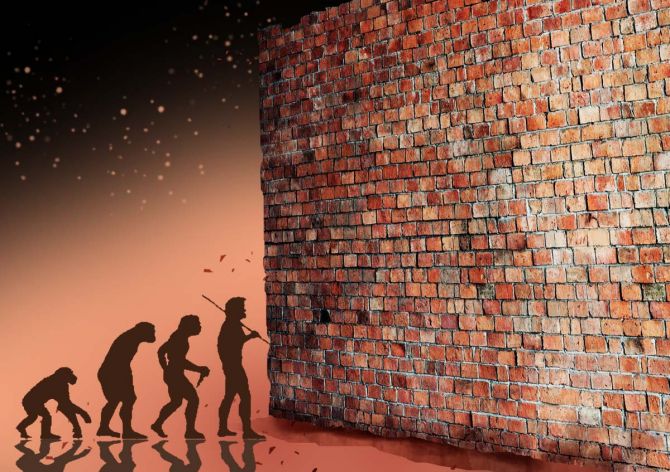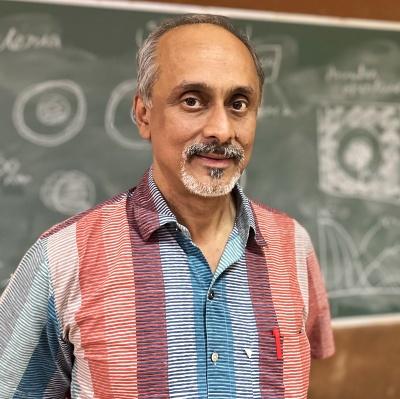'We will bring up students with an imperfect understanding of their own history and a superficial understanding of science.'
'This is not what we should be doing to future generations.'

A chapter on the Mughals in school text books. Control Alt Delete.
A chapter on Mahatma Gandhi's assassination. Control Alt Delete.
A chapter on Darwin's theory of evolution. Control Alt Delete.
From the chapter 'Heredity and Evolution', Evolution disappears.
This is how NCERT textbooks are changing of late.
When Darwin's theory of evolution vanished from the school text books, more than 1,800 scientists, science teachers and educators wrote an open letter expressing their concern.
"We should decide what is the minimum knowledge a student who finishes school should have in science, history, languages as well as other subjects. If we do not agree on and seek to provide that common minimum knowledge, these students will not be prepared to deal with the world," Dr Gautam Menon -- Dean (Research) and Professor, Departments of Physics and Biology, Ashoka University -- tells Rediff.com's Shobha Warrier.
As a professor of science, what came to your mind when you heard about NCERT removing the chapter on Darwin's theory of evolution from the 10th standard textbook?
First, I wanted to check if it was actually true. So, I went to the NCERT Web site to examine the list of changes they had made.
I found that it was true that many of the important aspects of the theory of evolution, developed by Darwin, had indeed been removed from the textbook.
Evolution is the most important scientific insight we have into life on earth.
It is central to the way we think about biology.
The idea of a school level education is to ensure a common background for all students in what we believe is central to knowledge about our world.
This omission is a serious error of judgment.
What could be the reason according to you, for omitting such an important part of science? First, they tampered with history, now science...
The ostensible reason is that they wanted to lighten the load for students.
It is certainly true that we burden the students with lots and lots of material and that school-level education has largely become an exercise in memorisation as opposed to an exercise in understanding.
Even then, to leave this particular aspect out makes little sense.
There are many things that could have been left out, or at least dealt with in less detail, if they really wanted to reduce the burden.
Some have raised the possibility that this is a deliberate act, as part of what the government wanted to emphasise, to stress non-scientific ways of thinking about life on earth, perhaps even approaches based on religion.
I do not know if this is true, but I am willing to give them the benefit of doubt on this issue, provided their logic can be explained.
The NCERT says it is a curriculum rationalisation exercise. Can they justify dropping topics like evolution, acquired and inherited traits, evolution by stages, etc, a rationalisation exercise?
To me, this has little meaning.
If there is anything that should be kept in the curriculum, it is Darwin's theory of evolution and most of the attendant discussions.
As I pointed out earlier, evolution is very fundamental to the way we think about biology.
All living creatures are a product of evolution. All natural diversity comes from evolution.
Therefore, you cannot leave this out of the textbook when everyone who graduates from school should be expected to know this, at the minimum, even if they will never do biology or even any science after this.

IMAGE: Dr Gautam Menon, Dean (Research) and Professor, Physics and Biology, Ashoka University.
When this is the most basic part of biology and life itself...
That's right. Another part that has been dropped from the 10th standard science textbook is the periodic table of elements. Again, I cannot understand this.
The periodic table and the logical organisation of elements is fundamental to chemistry and for the understanding of chemistry.
To leave that out is not preparing students adequately for things they may have to learn in future.
All students should be expected to have a knowledge of these basic aspects of chemistry.
Again, I don't see any rationale behind this particular omission either.
Several scientists, teachers and academicians have written an open letter expressing their concern. They were of the opinion that such omissions would affect the scientific temper of the students. What can the scientific community and the teachers do about this?
In this case, they can only exert moral pressure on NCERT to reinstate these omitted chapters, and to examine whether the reduction in syllabus can be achieved by cutting other areas which are less central.
You can concentrate on those areas for reduction and not areas that are core to science.
You should not tamper with the areas that are fundamental to science.
I hope they will go back and re-examine this.
I notice there is nothing on their webpage concerning the committee that made these changes.
There is no explanation on why these parts were dropped from the textbook.
The public should know who was appointed to the committee that made such a decision and why they came to such a conclusion. They owe the Indian public this much.
Do you feel the NCERT should first appoint a group of experts like teachers, scientists and historians in the committee, and they also have to be transparent about exercises like these?
Absolutely. We should know who were the people who made such a decision. We should know why these decisions were made.
It is good to have broad based committees with teachers, lecturers, scientists and possibly parents in them, to decide how much has to be taught, and what changes should be made, if something has to be changed in the syllabus. This should not be hard to do.
After NCERT decided to drop chapters in many subjects, the Kerala government is planning to provide books with those dropped chapters. Of course, this will be done only in some states. But will this solve the problem?
It is only a temporary solution and not an optimal solution.
The optimal solution should be a careful examination of the textbooks to find out whether they need to be improved, whether the material needs to be reduced and if so, how do we reduce, etc. but in a public way, with discussions and explanations.
I do not want to argue that textbooks cannot be changed at all.
We should decide what we should teach, and at what level, and what is the minimum amount of background any student should have.
This can be done only after a reasonable broad discussion on what should go into a textbook.
And, certainly, textbooks should be re-examined periodically to make sure they are achieving the purpose for which they are intended and to ensure that they are up-to-date.
Do you think the time has come for a national debate on what children should study in school?
I think there should be a debate on what should go into textbooks, based on ideas from a broad expert committee who have knowledge of these areas.
This is not rocket science -- many countries have made similar decisions.
I found earlier NCERT textbooks actually were very good from many points of view.
But such a committee should make their deliberations public, to avoid situations like the current one.
They have a responsibility to show that there is a definite logic behind their acts and that political considerations did not enter their discussions.
What kind of impact will tampering of history, science, etc have on the future generations?
We will bring up students with an imperfect understanding of their own history and a superficial understanding of science.
This is not what we should be doing to future generations.
We should prepare them to deal with and understand politics, scientific issues, history etc. and to be able to look at them critically.
This is the only way we can have good citizens which, after all, should be the goal of an education.
The less we provide them the ability to do so, the worse off generations of future students will be in terms of their intellectual development.
The complaint by industry about India's education system is that even though it produces thousands and thousands of engineers, majority of them are not employable. With this kind of approach by the NCERT, will it not become worse?
That is a problem with higher education. We need to address that separately. But at least we should not exacerbate the problem by having students who are ill-prepared at the input stage.
First, we should decide what is the minimum knowledge a student who finishes school should have in science, history, languages as well as other subjects.
If we do not agree on and seek to provide that common minimum knowledge, these students will not be prepared to deal with the world. That will impact their ability to profit from higher education.
Feature Presentation: Rajesh Alva/Rediff.com









